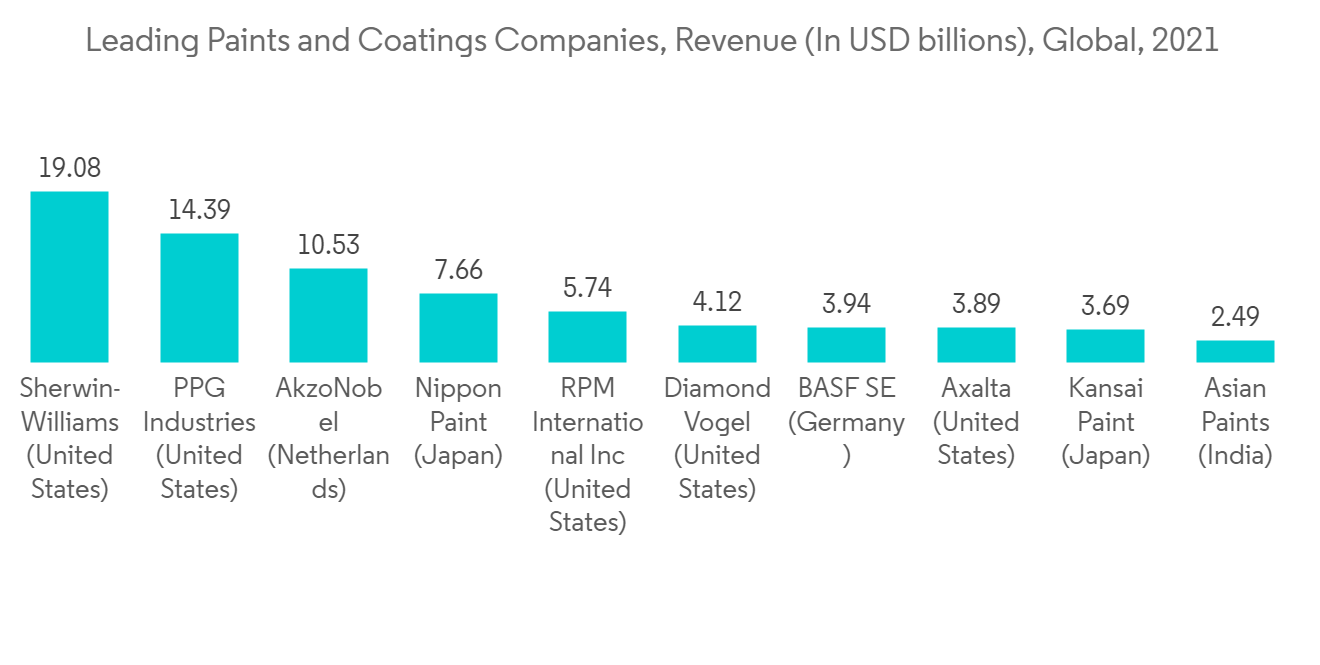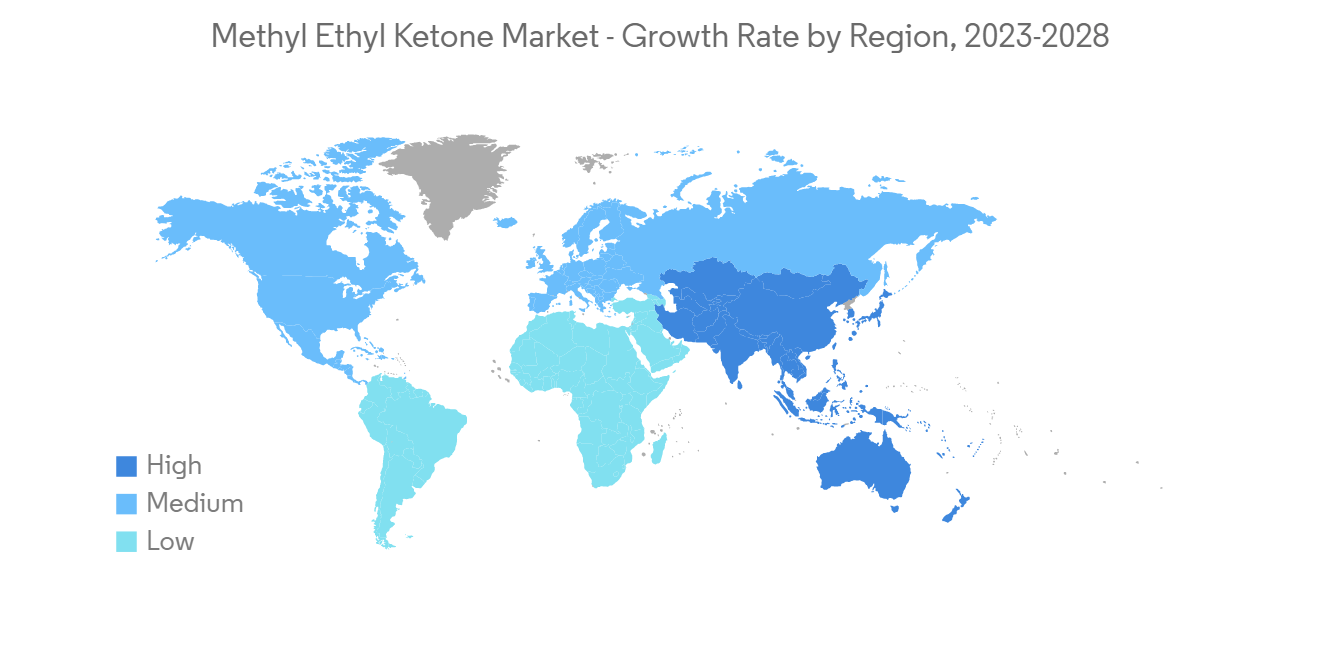 |
市场调查报告书
商品编码
1273399
甲基乙基酮市场 - 增长、趋势、COVID-19 影响和预测 (2023-2028)Methyl Ethyl Ketone Market - Growth, Trends, and Forecasts (2023 - 2028) |
||||||
※ 本网页内容可能与最新版本有所差异。详细情况请与我们联繫。
在预测期内,甲基乙基酮市场的复合年增长率预计将超过 4.5%。
2020 年 COVID-19 对市场造成了伤害。 鑑于大流行情况,汽车和製造活动在封锁期间暂时停止,以减少甲基乙基酮作为一种成分的使用,从而影响市场。 然而,随着限制的放宽,市场开始加快步伐。
主要亮点
- 短期内,建筑行业的树脂、油漆和涂料等应用对 MEK 的需求不断增加,以及製药行业越来越多地使用 MEK 作为溶剂,预计这些都将推动市场扩张。
- 另一方面,人们越来越意识到 MEK 的毒性可能会阻碍市场增长。
- 政府对基础设施发展的投资不断增加,预计很快就会为市场增长提供各种机会。
- 亚太地区主导市场,预计在预测期内将继续保持最高的复合年增长率。
甲乙酮市场趋势
油漆和涂料领域主导市场需求
- 甲乙酮的最大消费者是油漆和涂料行业。 MEK 是一种用于油漆和涂料领域的优良溶剂。 油漆和涂料的主要消费部门是建筑业。
- 亚太地区和北美的住宅建设正在蓬勃发展,在预测期内,住宅 MEK 的需求可能会增加。
- 在北美,建筑行业正在健康发展,在美国和加拿大进行了大量投资。 根据美国人口普查局的数据,该国 2022 年 12 月的建筑支出经季节性调整后的年率估计为 18,099 亿美元,比 11 月修正后的数字 18,173 亿美元低 0.4%。 然而,2022 年 12 月的数字比去年 12 月估计的 16,810 亿美元高出约 8%。
- 此外,2022 年的建筑支出约为 1.79 万亿美元,比 2021 年的 1.6 万亿美元高出约 10%,这增加了建筑应用中油漆和涂料的消费。
- 汽车行业也是油漆和涂料的主要最终用途。 根据国际汽车製造商组织 (OICA) 的数据,全球汽车产量增长了 3%。 2020年产量为7771万辆,2021年将增至8014万辆。 因此,后 COVID 时代对汽车设备的需求增加可能会扩大油漆和涂料市场,从而扩大 MEK 市场。
- 欧洲有许多大型涂料工业,以德国、法国、意大利和西班牙四大经济区为中心。 德国是最大的油漆和涂料市场,拥有约 300 家油漆、油漆和油墨生产商,德国是欧洲最大的油漆出口国。
- 因此,预计上述因素将在未来几年对市场产生重大影响。

亚太地区主导市场
- 随着印度、中国、菲律宾、越南和印度尼西亚等国家/地区住宅和商业设施建设投资的增加,甲基乙基酮 (MEK) 市场预计在未来几年会增长。
- 目前,中国有多个机场建设项目处于开发和规划阶段。 中国民用航空局(CAAC)制定了到2035年建设216个新机场的目标,以满足日益增长的航空需求,预计到2035年新机场数量将增加450个。 此外,政府还推出了一项大规模建设计划,将在未来十年内将 2.5 亿人转移到新的特大城市。
- 中国是最大的汽车生产国和消费国。 中国汽车工业协会报告称,与上年相比,2022年中国汽车销量将增长2.1%左右。 2022 年售出约 2686 万辆汽车,而 2021 年售出 2627 万辆汽车。
- 到 2030 年,印度房地产行业的市场规模预计将达到 1 万亿美元,到 2025 年占该国 GDP 的 13% 左右。
- 截至 2022 年,印度是世界第四大橡胶消费国。 印度人均橡胶使用量目前为 1.2 公斤,而世界上为 3.2 公斤。 印度的橡胶工业产值约为 12,000 印度卢比(14.49 亿美元)。 轮胎行业消耗了印度大部分的橡胶产量,占该国总产量的一半以上。
- 根据日本国土交通省的数据,2022 年建筑业的总投资估计约为 66.99 万亿日元(5081.6 亿美元),比上一年增长 0.6%。
- 菲律宾统计局在其 2022 年年度报告中还指出,汽车和摩托车维修对该国的 GDP 增长做出了重大贡献(同比增长 7.6%)。 该分部是主要贡献者,约占整体扩张的 8.7%。
- 可支配收入的增加、生活水平的提高和城市化加速了中国、印度和日本等主要发达国家和新兴国家的建筑活动和汽车生产的扩张,导致对甲基乙基酮市场的需求增加。与增加。

甲乙酮行业概况
甲基乙基酮市场是一个整合市场,少数主要参与者占据了市场需求的很大份额。 市场参与者包括 Shell Plc、Arkema、Exxon Mobil Corporation、Nouryon 和 Sasol(排名不分先后)。
其他福利:
- Excel 格式的市场预测 (ME) 表
- 3 个月的分析师支持
内容
第一章介绍
- 调查先决条件
- 本次调查的范围
第二章研究方法论
第 3 章执行摘要
第四章市场动态
- 主持人
- 油漆和涂料的需求不断扩大
- 製药行业对树脂作为溶剂的需求不断扩大
- 约束因素
- 对 MEK 毒性的认识不断提高
- 工业价值链分析
- 波特的五力分析
- 供应商的议价能力
- 买家的议价能力
- 新进入者的威胁
- 替代品的威胁
- 竞争程度
- 技术快照
- 贸易分析
第 5 章市场细分(基于价值的市场规模)
- 申请
- 溶剂
- 树脂
- 油墨
- 粘合剂
- 其他用途
- 最终用户行业
- 油漆和涂料
- 橡胶
- 建筑相关
- 包装和出版
- 其他最终用户行业
- 地区
- 亚太地区
- 中国
- 印度
- 日本
- 韩国
- 其他亚太地区
- 北美
- 美国
- 加拿大
- 墨西哥
- 欧洲
- 德国
- 英国
- 法国
- 意大利
- 其他欧洲
- 南美洲
- 巴西
- 阿根廷
- 其他南美洲
- 中东和非洲
- 沙特阿拉伯
- 南非
- 其他中东和非洲地区
- 亚太地区
第六章竞争格局
- 併购、合资、合作、合同等。
- 市场份额 (%)**/排名分析
- 主要公司采用的策略
- 公司简介
- Arkema
- Cetex Petrochemicals
- China National Petroleum Corporation
- Exxon Mobil Corporation
- Idemitsu Kosan Co., Ltd
- INEOS
- Maruzen Petrochemical
- Nouryon
- Shell Plc
- Sasol
- Tasco Chemicals
- Zibo Qixiang chemical Co., Ltd
第七章市场机会与未来趋势
- 增加政府对基础设施发展的投资
The methyl ethyl ketone market is projected to register a CAGR of over 4.5% during the forecast period.
COVID-19 harmed the market in 2020. Given the pandemic scenario, automotive and manufacturing activities were temporarily halted during the lockdown, reducing the usage of methyl ethyl ketone as a component and thereby impacting the market. But with the easing of the restrictions, the market started to gather pace over time.
Key Highlights
- In the short term, rising demand for MEK in the construction industry for applications such as resins, paints, and coatings, as well as increased use of MEK as a solvent in the pharmaceutical industry, are likely to fuel market expansion.
- On the flip side, the increasing awareness regarding the toxic effects of MEK is likely to hamper the growth of the market studied.
- Increasing government investments in infrastructural developments are expected to offer various opportunities for market growth shortly.
- The Asia-Pacific region is expected to dominate the market and is also likely to witness the highest CAGR during the forecast period.
Methyl Ethyl Ketone Market Trends
Paints and Coatings Segment to Dominate the Market Demand
- The paints and coatings segment stands to be the largest consumer of methyl ethyl ketone. MEK is an excellent solvent for use in the paints and coatings sector. The paints and coatings major consumption is in the construction industry.
- Asia-Pacific and North America regions have been witnessing strong growth in residential construction, which is further likely to increase the demand for MEK for residential applications during the forecast period.
- North America witnessed healthy growth in the construction sector due to significant investments in the United States and Canada. According to the US Census Bureau, in December 2022, construction spending in the country was estimated at a seasonally adjusted annual rate of USD 1,809.9 billion, 0.4% below the revised November estimate of USD 1,817.3 billion. However, the December 2022 figure is about 8% above the previous year's December estimate of USD 1,681.0 billion.
- Moreover, in 2022, construction spending amounted to a value of about USD 1,790 billion, around 10% above USD 1,600 billion in 2021, thereby increasing the consumption of paints and coatings in construction applications.
- The automotive industry is also a major end-use for paints and coatings. According to the Organisation Internationale des Constructeurs d'Automobiles (OICA), the global production of motor vehicles saw a 3% growth. The production in 2020, which was 77.71 million units, increased to 80.14 million units in 2021. Thus, the increasing demand for automobile units after the COVID era will likely increase the market of paints and coatings and, eventually, of MEK.
- Europe is home to many large paint industries, with the four largest mainland economies of Germany, France, Italy, and Spain. Germany is the largest market of paints and coatings and is home to approximately 300 coatings, paint, and printing ink-producing companies, and Germany is Europe's largest exporter of coatings.
- Therefore, the above factors are expected to significantly impact the market in the coming years.

Asia-Pacific Region to Dominate the Market
- With growing residential and commercial construction investments in countries such as India, China, the Philippines, Vietnam, and Indonesia, the methyl ethyl ketone (MEK) market is expected to increase in the coming years.
- Currently, China includes numerous airport construction projects in the development or planning stage. The Civil Aviation Administration of China (CAAC) aims to construct 216 new airports by 2035 to meet the growing demands for air travel, and this number is likely to hit 450 by 2035. Additionally, the government rolled out massive construction plans to move 250 million people to its new megacities over the next ten years.
- China is the largest producer and consumer of automotive vehicles. The China Association of Automobile Manufacturers reports that, compared to the prior year, China's automobile sales increased by about 2.1% in 2022. Compared to the 26.27 million automobiles sold in 2021, around 26.86 million were sold in 2022.
- Indian Real Estate sector is expected to reach a market size of USD 1 trillion by 2030, and its contribution to the country's GDP is expected to be approximately 13% by 2025.
- India is the fourth-largest consumer of rubber in the world as of 2022. Rubber usage per capita in India is currently 1.2 kg, compared to 3.2 kg globally. India's rubber industry generates approximately INR 12000 crores (USD 1,449 million). The tire sector consumes most of India's rubber production, accounting for over half of the country's total output.
- According to Japan's Ministry of Land, Infrastructure, Transport, and Tourism (MLIT), overall investment in the construction sector in 2022 is estimated to be around JPY 66,990 billion (USD 508.16 billion), a 0.6% increase over the previous year.
- The Philippine Statistics Authority also mentioned in its annual report for 2022 that motor vehicles and motorcycle maintenance played a significant part in the country's GDP growth of 7.6% over the previous year. The segment was the main contributor, accounting for around 8.7% of overall expansion.
- Because of the rising disposable income, greater living standards, and urbanization, major developed and developing countries such as China, India, and Japan are witnessing faster expansion in construction activities and automotive production, resulting in increased demand for the methyl ethyl ketone market.

Methyl Ethyl Ketone Industry Overview
The methyl ethyl ketone market is a consolidated market, where a few major players hold a significant share of the market demand. Some of the major players in the market include (not in a particular order) Shell Plc, Arkema, Exxon Mobil Corporation, Nouryon, and Sasol, among others.
Additional Benefits:
- The market estimate (ME) sheet in Excel format
- 3 months of analyst support
TABLE OF CONTENTS
1 INTRODUCTION
- 1.1 Study Assumptions
- 1.2 Scope of the Study
2 RESEARCH METHODOLOGY
3 EXECUTIVE SUMMARY
4 MARKET DYNAMICS
- 4.1 Drivers
- 4.1.1 Growing Demand for Paints and Coatings
- 4.1.2 Growing Demand for Resins as Solvent in the Pharmaceutical Industry
- 4.2 Restraints
- 4.2.1 Increasing Awareness About Toxic Effects of MEK
- 4.3 Industry Value Chain Analysis
- 4.4 Porter's Five Forces Analysis
- 4.4.1 Bargaining Power of Suppliers
- 4.4.2 Bargaining Power of Buyers
- 4.4.3 Threat of New Entrants
- 4.4.4 Threat of Substitute Products and Services
- 4.4.5 Degree of Competition
- 4.5 Technological Snapshot
- 4.6 Trade Analysis
5 MARKET SEGMENTATION (Market Size in Value)
- 5.1 Application
- 5.1.1 Solvent
- 5.1.2 Resin
- 5.1.3 Printing Ink
- 5.1.4 Adhesive
- 5.1.5 Other Applications
- 5.2 End-user Industry
- 5.2.1 Paints and Coatings
- 5.2.2 Rubber
- 5.2.3 Construction
- 5.2.4 Packaging and Publishing
- 5.2.5 Other End-user Industries
- 5.3 Geography
- 5.3.1 Asia-Pacific
- 5.3.1.1 China
- 5.3.1.2 India
- 5.3.1.3 Japan
- 5.3.1.4 South Korea
- 5.3.1.5 Rest of Asia-Pacific
- 5.3.2 North America
- 5.3.2.1 United States
- 5.3.2.2 Canada
- 5.3.2.3 Mexico
- 5.3.3 Europe
- 5.3.3.1 Germany
- 5.3.3.2 United Kingdom
- 5.3.3.3 France
- 5.3.3.4 Italy
- 5.3.3.5 Rest of Europe
- 5.3.4 South America
- 5.3.4.1 Brazil
- 5.3.4.2 Argentina
- 5.3.4.3 Rest of South America
- 5.3.5 Middle-East and Africa
- 5.3.5.1 Saudi Arabia
- 5.3.5.2 South Africa
- 5.3.5.3 Rest of Middle-East and Africa
- 5.3.1 Asia-Pacific
6 COMPETITIVE LANDSCAPE
- 6.1 Mergers and Acquisitions, Joint Ventures, Collaborations, and Agreements
- 6.2 Market Share (%)**/Ranking Analysis
- 6.3 Strategies Adopted by Leading Players
- 6.4 Company Profiles
- 6.4.1 Arkema
- 6.4.2 Cetex Petrochemicals
- 6.4.3 China National Petroleum Corporation
- 6.4.4 Exxon Mobil Corporation
- 6.4.5 Idemitsu Kosan Co., Ltd
- 6.4.6 INEOS
- 6.4.7 Maruzen Petrochemical
- 6.4.8 Nouryon
- 6.4.9 Shell Plc
- 6.4.10 Sasol
- 6.4.11 Tasco Chemicals
- 6.4.12 Zibo Qixiang chemical Co., Ltd
7 MARKET OPPORTUNITIES AND FUTURE TRENDS
- 7.1 Increasing Government Investments for Infrastructural Developments









